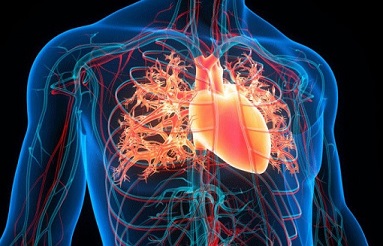COVID-19 News: Researchers Uncover That Interleukin 6 Is Associated With Heart Failure In SARS-CoV-2 Infected Individuals
Nikhil Prasad Fact checked by:Thailand Medical News Team Jan 26, 2024 2 years, 2 weeks, 5 days, 10 hours, 17 minutes ago
COVID-19 News: The COVID-19 pandemic, caused by the severe acute respiratory syndrome coronavirus 2 (SARS-CoV-2), has presented an unprecedented global health challenge. Beyond its well-documented respiratory impact, emerging evidence suggests a significant association between COVID-19 and heart failure (HF). A groundbreaking study covered in this
COVID-19 News report conducted by researchers at Tongji University in Shanghai, China, sheds light on the intricate relationship between COVID-19, inflammatory factors, and heart failure, specifically highlighting the predictive potential of interleukin-6 (IL-6).
 Interleukin 6 Is Associated With Heart Failure In SARS-CoV-2 Infected Individuals
Understanding the Burden of COVID-19-Associated Heart Failure
Interleukin 6 Is Associated With Heart Failure In SARS-CoV-2 Infected Individuals
Understanding the Burden of COVID-19-Associated Heart Failure
While COVID-19 primarily targets the respiratory system, it is becoming increasingly evident that the virus also inflicts considerable damage on the cardiovascular system. Recent studies conducted in Wuhan, China, revealed that around 23% of COVID-19 patients experienced heart failure. Furthermore, heart failure emerged as the fourth-most common complication associated with COVID-19, even in patients without a prior history of cardiovascular disease. This underscores the urgent need to comprehend the underlying factors contributing to COVID-19-related heart failure.
Inflammation and COVID-19-Related Heart Failure
The study from Tongji University hypothesizes that inflammation plays a pivotal role in the development of COVID-19-induced heart failure. Upon infection, SARS-CoV-2 rapidly replicates in various organs, triggering the infiltration of inflammatory cells. These cells, including neutrophils, monocytes/macrophages, and lymphocytes, release a cascade of cytokines such as interleukin (IL)-1β, IL-6, and IL-8. This inflammatory response is thought to upregulate matrix metalloproteinases, protease-activated receptors, and nitric oxide synthase expression, leading to severe oxidative stress and potentially resulting in heart failure.
Key Findings from the Retrospective Study
The retrospective study conducted at Shanghai Public Health Center involved 212 adult patients with COVID-19, hospitalized between March 1 and May 30, 2022. Among these patients, 80 experienced heart failure, while 132 did not. The analysis of various markers, including high-sensitivity C-reactive protein (hs-CRP), procalcitonin (PCT), and inflammatory factors such as IL-6, revealed significant differences between the two groups. Notably, logistic regression analysis identified a robust positive association between IL-6 and heart failure, with older age, higher hs-CRP levels, and elevated IL-6 correlating with an increased risk of heart failure.
Clinical Characteristics and Cytokine Levels
In delving into the demographic and clinical characteristics, the study unveiled noteworthy distinctions between the heart failure and non-heart failure groups. Patients in the heart failure group were older, more likely to be women, and had a higher prevalence of common COVID-19 cas
es. Additionally, hypertension and diabetes were more prevalent in the heart failure group. Analysis of cytokine levels, including troponin, myoglobin, IL-6, and others, emphasized elevated levels in the heart failure group, further underlining the connection between inflammation and heart failure in COVID-19 patients.
Correlation Analysis and Potential Therapeutic Implications
The study went on to explore the correlation between IL-6 and various inflammatory markers, revealing a positive association with hs-CRP, PCT, and other cytokines. This suggests that IL-6 is a key player in the inflammatory cascade response during COVID-19. Importantly, the research delved into potential therapeutic implications, highlighting IL-6 as a crucial factor in the pathogenesis of heart failure. Tocilizumab, an IL-6 inhibitor, emerged as a promising therapeutic intervention for severe COVID-19 cases with elevated IL-6 levels.
Limitations and Future Directions
Acknowledging its limitations, the study outlined the need for further investigation, including expanding the sample size, conducting multi-center studies, and exploring different populations to confirm the conclusions. The complexity of inflammatory responses and the potential involvement of other cytokines underscore the necessity for comprehensive research on targeted anti-cytokine therapy.
Conclusion
In conclusion, the Tongji University retrospective study adds a crucial layer to our understanding of the intricate relationship between COVID-19, inflammation, and heart failure. Elevated levels of IL-6 were strongly correlated with COVID-19-related heart failure, positioning IL-6 as a potential biomarker and therapeutic target. While IL-6 inhibitors like tocilizumab show promise, the study emphasizes the need for further research to develop effective treatments for COVID-19-related heart failure.
As the global community grapples with the evolving landscape of the COVID-19 pandemic, the insights provided by this study contribute significantly to our understanding of the disease's multifaceted impact. The intersection of respiratory and cardiovascular complications underscores the importance of a holistic approach to managing and treating COVID-19. With ongoing research and collaborative efforts, the medical community stands poised to uncover more targeted therapeutic strategies, ultimately improving outcomes for patients affected by COVID-19-related heart failure.
The study findings were published in the peer reviewed journal: Cytokine
https://www.sciencedirect.com/science/article/pii/S1043466624000176
For the latest
COVID-19 News, keep on logging to Thailand Medical News.
